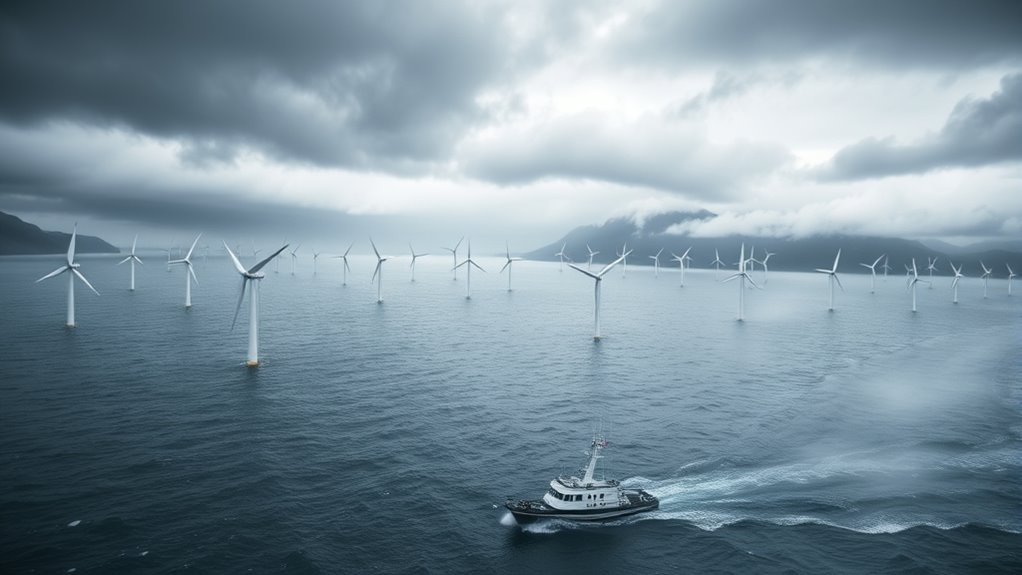Norway's PST is sounding the alarm on increased Russian espionage efforts, specifically targeting offshore wind farms. They've noted suspicious activities and identified Russian spy vessels mapping critical marine infrastructure. With rising tensions, the threat to these facilities is real and could disrupt energy supplies across Europe. Enhanced security measures are urgently needed to counteract these infiltration attempts. You might want to explore what specific steps Norway is taking to protect its assets.
Key Takeaways
- Norway's PST reports increased Russian espionage activities targeting offshore wind farms as part of a broader strategy to undermine national security.
- Russian spy vessels have been detected mapping critical offshore infrastructure, raising concerns about potential sabotage.
- Infiltrators often blend into local communities, making it difficult to identify threats to offshore facilities.
- Norway is enhancing security measures and collaborating with allied nations to protect vital energy installations.
- The ongoing threat of espionage necessitates heightened vigilance and modern surveillance technologies to safeguard offshore wind farms.

As tensions rise in Europe, Norway's Police Security Service (PST) has sounded the alarm about an alarming increase in Russian espionage activities within its borders. Since the conflict in Ukraine escalated in 2022, you might've noticed a surge in suspicious activities, particularly targeting critical infrastructure. The PST recently expelled over 15 Russian embassy staff suspected of espionage, highlighting the severity of the situation.
The primary targets of these espionage efforts include military facilities, energy installations, and notably, offshore wind farms. You may be wondering why Norway's wind energy sector is under threat. The answer lies in Russia's motivations to undermine Norway's support for Ukraine and disrupt its reputation on the global stage. Infiltrators often blend into the local population, making it hard to recognize them as foreign agents. This tactic complicates the security landscape, as you could encounter someone who seems perfectly normal, yet could pose a risk to national security. Additionally, Norwegian special services have exposed numerous Russian spies targeting critical infrastructure, underscoring the extensive nature of these espionage activities.
The PST has successfully exposed several Russian spies operating in Western Norway. These agents are suspected of preparing acts of sabotage against vital infrastructure, like the Haakonsvern naval base and crucial oil, gas, and power installations. Given Norway's NATO membership and its unwavering support for Ukraine, the country faces heightened security risks. You might find it alarming that disruptions to these facilities could trigger widespread supply issues throughout Europe, further emphasizing the urgency of the situation.
To combat these threats, Norway is ramping up its security measures in collaboration with allied nations. There's a pressing need for enhanced military spending and the adoption of modern surveillance technologies to safeguard critical infrastructure. The persistent threat from Russia requires vigilance, and you can expect that the trend of espionage and potential sabotage will continue.
Moreover, Russian spy vessels are reportedly mapping offshore critical infrastructure across the Nordics, raising significant alarms. Concerns about potential sabotage of offshore wind farms and marine infrastructure are growing. The presence of suspected fake research vessels in Nordic waters adds another layer of complexity to the situation.
As a resident of Norway, staying informed about these developments is crucial, as increased surveillance and regional cooperation among Nordic countries are essential in addressing these security challenges. The threat is real, and it's imperative to remain aware and vigilant.
Frequently Asked Questions
What Is the Role of Norway's PST in National Security?
Norway's PST plays a crucial role in national security by assessing threats and implementing countermeasures.
You can see they focus on counterterrorism, counterintelligence, and protecting critical infrastructure. Their collaboration with foreign security services enhances their effectiveness.
With ongoing threat monitoring and resource allocation, PST continually adapts to emerging risks.
How Does Norway Protect Its Offshore Wind Farms From Espionage?
Imagine a fortress standing tall against an unseen enemy, its walls fortified by technology and vigilance.
Norway protects its offshore wind farms by implementing rigorous security measures, including continuous monitoring systems and regular risk assessments.
You'll find IoT platforms and fibre-optic technology working tirelessly, detecting any suspicious activity.
International cooperation and public awareness further bolster defenses, ensuring that the winds of energy remain safe from those who seek to disrupt and undermine.
What Are the Potential Consequences of Russian Espionage in Norway?
If Russian espionage succeeds in Norway, you might see significant consequences.
Energy supply disruptions could lead to rising prices and economic strain across Europe, impacting your daily life.
Politically, Norway's relations with NATO might weaken, complicating collective defense strategies.
Internationally, the country's reputation could suffer, affecting diplomatic ties.
You may also notice increased security measures and investments aimed at countering these threats, as Norway works to safeguard its critical infrastructure.
Are There Similar Threats to Other Countries' Energy Infrastructure?
Oh sure, let's just pretend that only Norway has to worry about sneaky spies in their energy sector!
In reality, countries worldwide face similar threats. From ransomware attacks to supply chain vulnerabilities, your energy infrastructure isn't safe either. Nation-states love targeting critical assets, and outdated systems just make it easier for hackers.
What Measures Can Individuals Take to Report Suspicious Activities?
If you notice suspicious activities, take action by reporting them immediately.
Use local reporting channels or apps like See Send to submit your observations. Make sure to include the 5Ws—who, what, when, where, and why.
Stay vigilant and watch for unusual behavior or equipment, especially near critical infrastructure.
Remember to maintain confidentiality and encourage others in your community to report anything that seems off.
Your vigilance can help keep everyone safe.
Conclusion
In a world where the winds of change blow fiercely, the shadows of espionage are creeping closer. Just as Odysseus faced the cunning of the Cyclops, Norway must remain vigilant against the threats lurking in its offshore wind farms. The PST's warning isn't just a call to arms; it's a reminder that the safety of our energy future hinges on awareness and action. Let's not let our guard down, for even the mightiest winds can be tamed by unseen hands.









